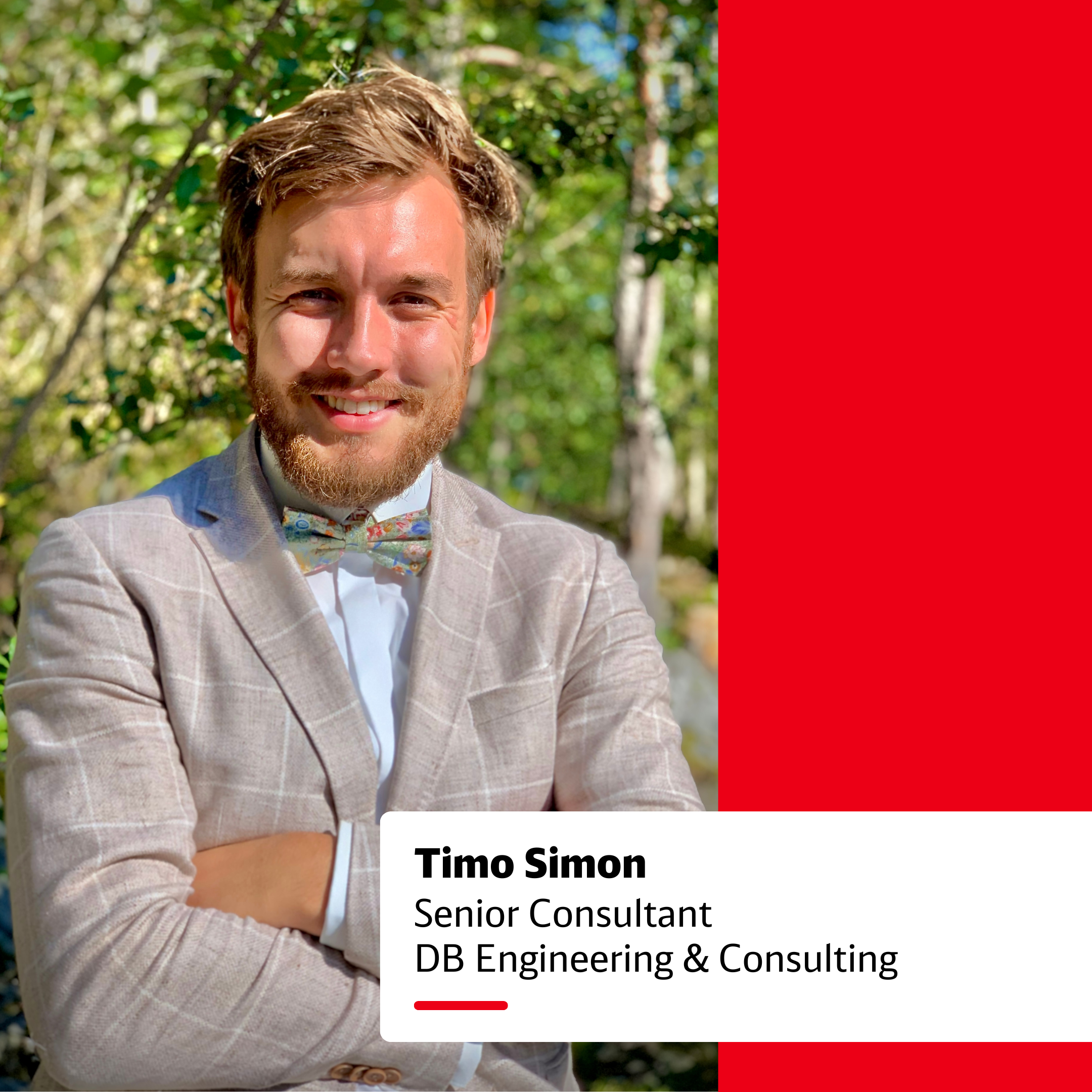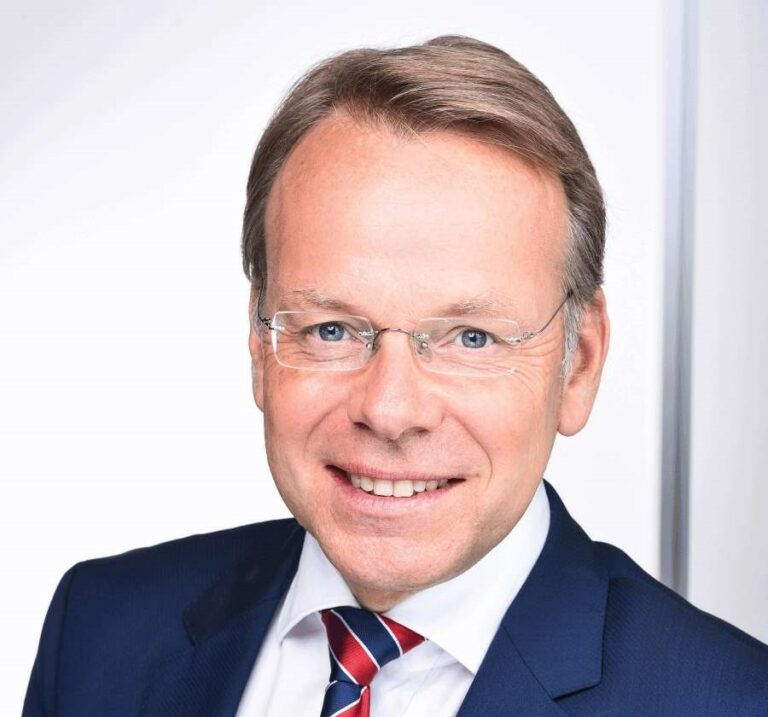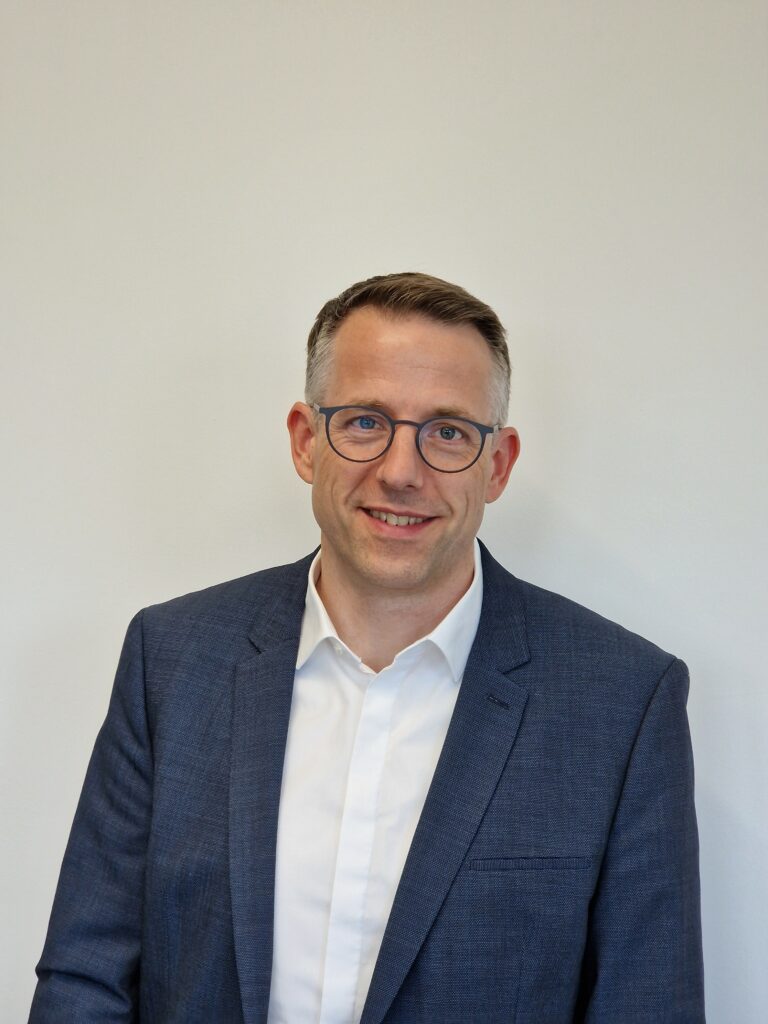In this interview, Timo Simon, Senior Consultant at DB E&C, shares his personal and professional journey to his exciting job in Mobility Consulting. From a rather accidental start at Deutsche Bahn to the challenges of a dual study program and a successful career in international consulting – Timo reports on how flexibility, professional development and balancing a career and a family have shaped his path.

Contact
DB Engineering & Consulting
EUREF-Campus 14
10829 Berlin
Germany
How did you come to work at DB E&C, and in Mobility Consulting in particular?
“I ended up at DB Engineering & Consulting somewhat by accident. When I went to college, I started out in a regular industrial engineering program but realized that I lacked some basic technical knowledge. After the first year, I felt more confident and decided to apply for cooperative education programs.
Deutsche Bahn was one of the companies I applied to. My career began at DB Netz. I connected with DB E&C towards the end of my cooperative education program and I also wrote my Bachelor’s thesis while there. What really won me over was DB E&C’s international focus. I was impressed by the warm welcome and the great working environment.
After graduating at 26, I immediately started out as a Junior Operations Consultant at DB E&C. I also began my Master’s degree part time. When my wife got pregnant, I decided to switch to working on my Master’s full time so that I would have more time for our child later. I managed to complete my Master’s degree in two years instead of three.
The support I received from the company was exceptional. My supervisors were always available for me and they supported my professional development, even after I switched to doing my Master’s full time. This flexibility and support were crucial for my career and personal development at DB E&C.”
What support have you received from DB E&C in terms of work-life balance?
“The support I have received from DB E&C for managing work and professional development has primarily been related to flexibility. I did my Master’s degree in Erfurt and the company allowed me to commute there twice a week using my NetzCard employee travel pass. On days when I had to be in Erfurt, I was able to work on the train and on campus. I spent the other three days of the week in Halle for a project.
In the beginning, this meant that I was on the road five days a week – from Berlin to Erfurt or Halle and back every day. It was exhausting, but necessary. Most of all, it was an exciting time. When the pandemic began, things got much easier since classes moved online and I could work from home.
My team was really understanding when I occasionally had to plan my work schedule around classes. Of course, there were overlaps where I missed a lecture due to a customer appointment. But the university was also understanding, as this situation was communicated transparently from the outset.
My experience has consistently been positive. Without this support and flexibility, I probably wouldn’t have been able to complete my Master’s degree, or perhaps never even started. My supervisors’ and colleagues’ willingness to support my professional development was crucial for my professional and academic progress.”
What’s it like as a young father to balance a career and a family while working at DB E&C?
“The ability for me, as a young father, to balance a career and a family at DB E&C is one of the main reasons why I have stayed here, despite occasional offers from other employers.
The flexibility I’ve been given is priceless. Of course, my priority is always to keep my appointments and do my job well. I enjoy a lot of freedom because I do good work and my team leader trusts me. I can work from home and have flexible hours, which allows me to play an active role in my child’s daily routine. If I have room in my calendar, I can also take a break to play with them. And then I work a few more hours in the evening after my child has gone to bed. Working this way lets me fine-tune my priorities daily.
We often need to work flexible hours in our international consulting business anyway. Appointments at off-peak times are part of our daily routine when we’re working on projects in the US, Canada or Asia, for example. This flexibility happens to also work well for me as a father.
I can arrange my day so that I can take my child to and from daycare. Being able to play an active role in my child’s life as they grow up is invaluable. I really appreciate the work-life balance that I have here.”
You have already said that during your studies it was clear to you that you wanted a job with an international company. Are you happy with that aspect of DB E&C?
“My idea of working internationally has changed over time. When I was younger, it was mainly about the thrill of traveling and the chance to see the world. Now, as a family man, I appreciate being able to spend more time at home.
The changes since Covid have had a positive impact. Our clients have realized that it is possible to work effectively from home, and that has reduced the need for frequent business trips. That’s a big plus for me.
These days, the complex challenges are what I especially appreciate about my work at DB E&C. Every day brings something new and unexpected. Our international clients’ requirements vary greatly, even when they have similar problems to solve. The cultural context, the way they communicate and the aspects they value most differ from country to country.
This diversity not only challenges my technical skills; it also challenges my social skills. I constantly have to adjust to new situations, people and ways of working. That prevents stagnation in my personal growth. I learn something new and broaden my horizons with every new project and every new client.
I need my work to be challenging and I need to learn something new every day. That’s essential. And that is exactly what my position gives me: the opportunity for continuous growth. Routine activities can’t do that. It’s the combination of challenging work and intercultural experience that makes my job so enriching and fulfilling.”
What do you think makes the Consulting organization at DB E&C different from other consulting companies?
“What sets Consulting at DB E&C apart from what other consulting companies offer is first and foremost our technical expertise. We don’t have standard solutions that we make fit different industries. Instead, we find technical solutions to specific problems.
Our team has a high level of specialist expertise. Every employee brings both methodological and advanced subject matter knowledge to the table. That encourages us to share knowledge and also puts us up against a steep learning curve. It allows us to grow with each project and makes sure we’re always able to offer modern and optimized solutions. We work closely together as a team to make the best use of our collective knowledge and present it to the client in the best possible way.
One difference for employees is our flexibility. We offer more personal freedom than many other consulting companies. That enables a significantly better work-life balance, which isn’t a given in the consulting industry. DB E&C has realized that ultimately our clients also benefit from this positive working environment since the consulting service they receive is from a highly motivated and knowledgeable source.
What’s more, we don’t expect recent graduates without any practical experience to advise on a wide range of sectors. Our consultants bring in-depth specialist knowledge and experience.
I think the combination of technically sound advice, real expertise and an employee-friendly corporate culture makes all the difference. At DB Engineering & Consulting, we know what we’re talking about – and our clients can tell.”
So would you say that one of the major unique selling propositions of the Consulting segment of DB E&C is that the infrastructure or engineering expertise is available and can be accessed in house?
“Yes, this is definitely one of the important aspects that make our Consulting segment unique. We have the advantage of being part of a large group, which sets us apart from many independent consulting companies. However, it doesn’t mean that we have unlimited access to all of the DB Group’s specialist knowledge.
Our knowledge advantage is based on employees moving between DB E&C and other DB Group divisions. Many of our consultants have extensive experience from various positions they have held within Deutsche Bahn. This practical experience is invaluable for our consulting work.
In my case, I trained as a signal setter and worked in different functions at DB Netz for four years. This experience gave me a solid understanding of rail operations and transport systems.
Our strength is this technical specialization, especially in rail transport. We have a discrete field of consulting, which we focus on, instead of spreading ourselves out over every possible field. We know exactly what we can and can’t do, and we really excel in the areas in which we have expertise.
This combination of advanced specialist knowledge, practical experience and focused specialization makes us a unique partner in the consulting landscape, especially when it comes to rail transport and related technologies.”
What would you say are the characteristics of applicants who are a particularly good fit for the team and the Consulting organization at DB E&C?
“For our consulting team, we are primarily looking for applicants with a high willingness to learn, a strong motivation to work and a pronounced curiosity for our specialist area. We don’t necessarily expect graduates to have extensive professional experience already. It’s much more important for them to be motivated and interested in becoming involved in a dynamic consulting environment.
We need flexibility in our industry. We sometimes have to work more than 40 hours a week to meet our clients’ requirements. But we’re able to make up for the extra hours later.
Successful applicants are also ready and able to become comfortable with new topics quickly. Every project comes with new challenges that we have to overcome together. That’s why we look for people who are bright and curious and who can learn quickly.
Of course it’s helpful to have basic knowledge in areas such as consulting and project management and a general understanding of the rail industry. We’re open to all kinds of educational backgrounds, including civil engineering and industrial engineering and even people with technical training, such as technicians or master craftspeople.
Ultimately, applicants have to be motivated, willing to learn and interested in new challenges. Applicants with this combination are particularly well qualified for our team. We are looking for people who are prepared to think outside the box and continuously develop their skills.”
What does your average workday in Mobility Consulting look like?
“My work at Mobility Consulting varies from day to day, which is something I appreciate. I have had the privilege of working on a variety of different projects – both within the DB Group and with external clients around the world. My work has taken me to countries such as Ukraine, Israel, Saudi Arabia, Egypt and Finland. I’ve also been involved in projects in Latin America, Canada and other regions.
I’ve worked on a wide range of projects, from recycling management and strategic infrastructure planning to feasibility studies for specific transport projects. I also work on process optimization in existing operating procedures and work structures and on maintenance optimization.
There is no such thing as a typical workday at our organization. Daily routines vary greatly depending on the project we’re working on and the client’s requirements. Some clients are particularly demanding, which can mean more intense periods of work, while other projects might be more relaxed.
This diversity and flexibility make my job so appealing. Every project brings new challenges and opportunities to learn, which always makes my workday exciting. It’s never boring.”
What are some of the special client demands you’re thinking of?
“Our clients’ requirements vary greatly depending on the project and region. A good example is my current project. We have very critical auditors as partners. Their daily audits and questions require maximum precision, and they need us to respond quickly. In contrast, we have had projects where it has taken a month before we get any feedback.
The project variety makes my day-to-day work exciting. We’ve been involved in a number of fascinating projects in recent years. For example, we are currently reviewing all infrastructure and operational planning and cost calculations for a large-scale project.
Projects that require brand new approaches are particularly challenging but also really rewarding. Working together with different top partner companies requires us to make constant adjustments and communicate frequently in small, intensive working groups, which I think is really inspiring.
One thing I can say about my typical workday is that it’s always unpredictable. In the five years I have been here, there has hardly been a day when I haven’t gone to work curious and looking forward to the day ahead. Every day brings new challenges and surprises, which makes my job so fulfilling.”
Are there any projects that have been particular highlights for you?
“There are two projects that left a big impression on me and that I still think about. The first was a strategic planning project with the Ukrainian state railroad. That project ended abruptly when the war began. I remember submitting my report late at night and the first news about the Russian invasion came in just as I was closing my laptop. It was one of the most challenging projects of my career, not only because of the complex project requirements, but also because of how warmly our Ukrainian colleagues welcomed us. And of course I’m still deeply concerned about the tragic developments in Ukraine.
The second project, Tracks for Peace, aimed to design a trade route from Israel to Oman. This project tied into my Bachelor’s thesis on a European Silk Road initiative and allowed me to put what I learned in college to practice. One of the project’s aims was to establish freight corridors on the Arabian Peninsula, which was also part of my Bachelor’s thesis. Unfortunately, this project is also on hold because of the geopolitical situation.”
Thank you for these very interesting and detailed insights.





